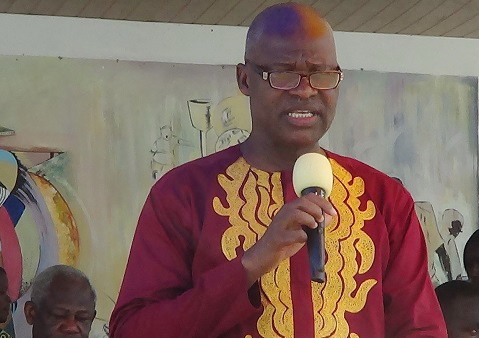
Implement ban on corporal punishment - GES Director-General
The Director General of the Ghana Education Service (GES), Mr Jacob Kor, has asked the management of all educational institutions to implement the ban on caning and other forms of corporal punishment with immediate effect.
"Whether it is private or public school, we are saying that there should be an official ban on caning in educational institutions, so any teacher who flouts this directive does so at his or her own risk, because if they are put before court, the management of GES will not support them," Mr Kor stressed this at the 86th anniversary and Speech and Prize-giving Day of Accra Academy last Saturday.
The occasion, which was hosted by the 1986 year group of the school, was euphoric and characterised by glitz and glamour as the rich academic prowess of the school was recounted.
It was on the theme: “Making Secondary Education Relevant – the Role of Information and Communications Technology.”
‘Teachers are key’
He further directed teachers to use alternative forms of punishment that would not be an impediment to the academic performance of students.
"The events that have unfolded as a result of the use of the cane are what have culminated in this directive. If students misbehave, teachers should not run out of patience to the extent that they stretch their hands and hit them," he said.
Mr Kor observed that teachers were key architects of developing the human resource base of the country, for which reason he urged parents and other stakeholders to use dialogue to settle all misunderstandings they had with them, rather than resorting to attacks.
"Teachers are like pilots. If you make just one mistake, you will kill many people in the long run. Zero tolerance for mistakes should be the concern of all teachers, he stressed.
Ban on mobile phones
The thunderous shouts of joy that greeted the directive on the ban of caning turned into a loud silence when Mr Kor re-emphasised that the use of mobile phones by pupils and students in basic and second cycle institutions would not be countenanced by the GES.
"Even though we are saying information and communications technology (ICT) ought to be incorporated into the teaching and learning process, the GES policy still frowns on the use of mobile phones by students in school.”
"The instruction is simple - do not use mobile phones in the school because they are destructive devices for your studies, " he added.
Challenges
While lauding the sacrifices made by the teaching and non-teaching staff to put the school on a high pedestal, the headmaster of Accra Academy, Mr Samuel Ofori-Adjei, said the government's policy to freeze employment had affected the staff numerical strength and posed a great challenge to security.
He, therefore, appealed to the GES to address the staff challenge, which, he said, was dwindling as compared with the soaring student population.
Mr Ofori-Adjei further observed that inadequate accommodation posed a major threat to the academic performance of students. He added that most of the students who commute to school daily due to lack of space on campus arrived late and missed lessons.
He said there was the need to revise the Computerised School Selection and Placement System (CSSPS) to inject some urgency into it.
"The CSSPS has to be done in a manner that will ensure the timely release of first year students.
"Most of the time, the first six weeks of the first term are lost because of late placement of students, a trend that has dire consequences on the performance of students," he said.
ICT
For his part, the Director in charge of health services at Al-Ayar Clinic, Dr Solomon N.K. Fixon-Owoo, who is a member of the 1986 year group of the school, stressed the need to use modern ICT methodology to facilitate academic work.
